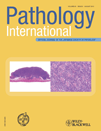Extensive endothelial replacement by tumor cells in the portal system: An autopsy case of intrahepatic cholangiocarcinoma
Abstract
An autopsy case of intrahepatic cholangiocarcinoma (ICC) with a peculiar form of extensive portal invasion is reported here. A 76-year-old woman presented with anorexia and abdominal discomfort. A high level of serum carbohydrate antigen 19-9 and endoscopically detected esophageal varices were found. Obvious mass lesion was not identified on CT scan and no portal blood flow was found. The patient died 6 months after admission. At autopsy multiple irregular shaped tumors in the liver were found. The size of the largest one was 3 × 2 cm. These tumors were well-differentiated adenocarcinomas with partial mucinous carcinoma morphology. Surprisingly, portal veins contained mucinous fluid and the inner surface was lined with a single layer of tumor cells but not endothelial cells. Invasion of carcinoma into the tissue outside the blood vessels was hardly observed in organs other than the liver. This form of extensive invasion of the tumor, termed intimal carcinoma spreading, caused complete obstruction of the portal system. To our knowledge there has been no report on this type of portal invasion of ICC.




